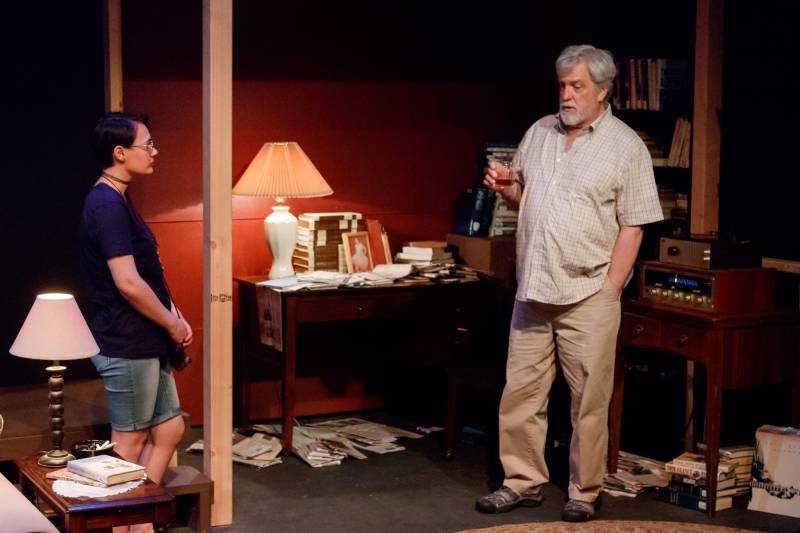Leo Tolstoy’s Anna Karenina begins with an oft-quoted line: “happy families are all alike; every unhappy family is unhappy in its own way.” Winner of the 2008 Pulitzer Prize for Drama, August: Osage County, written by Tracy Letts, directed at The Station Theater by Mathew Green, is dedicated to an exploration of the many ways a family can distinguish itself through tragedy and suffering and the idea that, no matter how hard you try, you can’t escape your roots.
August: Osage County is a story about the Westons, a tragicomically dysfunctional family and tribe of wounded souls, each with his or her own strife simmering just beneath the surface. They are burdened by cancer and childhood trauma, by addiction and infidelity and by each other. When the sudden death of one of their own reunites them under the roof of their childhood home, the collective weight of all their troubles, exacerbated by claustrophobic proximity and the sweltering heat of August on the Oklahoman plains, forces this group of people, seemingly pathologically incapable of coping with life, to come to terms with one another’s failings, shortcomings, pettiness and cruelty in a series of figuratively and literally violent confrontations.

It opens with Beverly Weston, portrayed admirably by Lincoln Machula, patriarch of the Weston family, once a poet of note, now a noted drunk, rambling around his home, drink in hand, waxing poetic about life, love and addiction. He peppers his ruminations with allusions to T.S. Eliot and delivers them with a besotted eloquence while the young woman he plans to hire on as a caretaker for his cancer-stricken wife listens patiently. He is looking for help because even though he knows “how to launder [his] dirty undies,” lately such quotidian tasks have been “getting in the way of [his] drinking.”
Beverly and his wife Violet, brought to mercurial life by Joi Hoffsommer, don’t live life as much as cope with it by chemically altering their perception of reality. As Beverly notes during his opening monologue, “[m]y wife takes pills and I drink. That’s the bargain we’ve struck.” Over the course of the first act, the house gradually fills with family returning to attend the funeral: first, Violet’s sister, Mattie Fae and her husband Charles, followed by the Weston daughters, Barbara, Ivy and Karen, their families and significant others. Throughout the second act, we learn how the rest of the family deals with their problems: some drink, others smoke pot; some fantasize about illicit love, others philander; some prey on the weaker and meeker members of the clan and others assert their frustrations in bursts of rage-filled invective, delivered in screaming barrages, often accompanied by physical blows.

At times, its seems like the only thing holding the family “together” are the physical confines of the once proud, now slowly dilapidating family homestead, a set rendered capably by designer Jadon Peck. However, the house itself (where all the action of the play takes place) is also a suffocating presence. Bev and Violet have sealed the windows to keep the daylight out. They refuse to turn on the air conditioning, even in the sweltering summer heat and once the entirety of the family is packed into the place, they’re often colliding with one another or with a wide variety of different booze bottles or stumbling upon little stashes of Violet’s pills secreted away in drawers and cabinets. The house, once a symbol of Bev’s poetic prowess, now a reminder of the sad state of the Weston family affairs, acts like a pot, catalyzing the increasingly savage confrontations that take place inside it, forcing the exchanges between family members to escalate from a bristling simmer to full, choleric boil many times over.
The interpersonal conflicts and tension that make up the majority of the play are interspersed with flashes of wry levity. In their better moments, the Westons reminisce about past loves and better times. They also crack many jokes at each others’ expense. And while there are many “laugh out loud” moments throughout the play, the majority come in the form of resigned observations or sarcastic nostalgia and underscore the belief that comedy often comes from dark places.
Given the gravity of the subject matter and the sheer length of the production, each member of the 13-person cast should be commended for delivering such energetic portrayals of their dramatic charges. One of the funniest (and most terrifying) characters in the play is the matriarch of the Weston family, Violet, who Hoffsommer infuses with vibrant life in a physical and emotionally charged performance.
Additional, notable performances were those turned in by Lincoln Machula as the charismatic but world-weary drunk, Beverly; Bri Coulter as the stoic, self-possessed Cheyenne caretaker, cook and confidant, Johnna Monevata; David Heckman as the slick and slimy, crocodile smiling Steve Heidebrecht; and Rachel Hejmanowski as the indignant heir-apparent to the Weston matriarchy, Barbara, who provides a delightfully rational foil to her mother’s stuporous, often cruel needling. Without a doubt, the interplay between Barbara and Violet provides for some of the most heart-rending and emotionally draining moments in the play, and this is in large part due to the vitality with which Hoffsommer and Hejmanowski portray their characters. Finally, a special commendation must be given to Jadon Peck’s set design, which admirably translated a large prairie home into the intimate performance space at the Station Theater with great spatial awareness and delightful attention to detail.
The Celebration Company’s portrayal of August: Osage County is an emotionally exhausting performance. It will make you laugh and it might even bring a tear to your eye. There is a good chance you will recognize and even empathize with some of the characters as tragic versions of people and family members in your life. In a lot of ways, the Osage County depicted in this play might be an analogue for some of the challenges facing the U.S. today: fading glory, ideological division and in-fighting, crumbling infrastructure, and trading on credibility borrowed from past accomplishments. And if you focus solely on those challenges, you might nod your head in agreement with Barbara as she notes, with incisive insight, that “[d]issipation is actually much worse than cataclysm.” Or maybe you’ll find a more productive way to cope.
________________________________________________________________________
August: Osage County, directed by Mathew Green, will be playing at the Station Theater in Urbana until May 12th. Click here for more details.
Photos by Jesse Folks.








